- Home
- Alice Walker
Anything We Love Can Be Saved Page 6
Anything We Love Can Be Saved Read online
Page 6
Diamonds, you know, start out as carbon, or coal, deep in the folds of the earth. Over eons enormous pressure builds up and crushes the coal into diamonds, the hardest crystals known. Then some of us, like Zora, are crushed further, by the lies of enemies and the envious hostility of friends, by injustice, poverty, and ill health, until all that is left is diamond ash. For many years now, thanks to Robert Hemenway, thanks to Mary Helen Washington, thanks to Charlotte Hunt, thanks to Sherley Anne Williams, thanks to feminist and womanist scholars around the world, and thanks to millions of readers, Zora’s diamond ash, her spirit, has been blowing across the planet on the winds of our delight, our excitement, our love.
And this is only right; it is the universe’s justice. And it proves something that I think many of us here very much needed to see proved, twenty-odd years ago, when the commonest response to a comment about Zora was the question Zora Who?: that love and justice and truth are the only monuments that generate ever-widening circles of energy and life. Love and justice and truth the only monuments that endure, though trashed and trampled, generation after generation. We have, together, accomplished the resurrection of Zora Neale Hurston and her splendid work, and can now tell our children what we have learned from this experience. Our children, who are by now grown up enough to fly off on mysterious pilgrimages of their own. We can say with conviction that anything they love can be sheltered by their love; anything they truly love can be saved. First in their own hearts, and then in the hearts of others. They have only to make their love inseparable from their belief. And both inseparable from hard work.
We can tell them that on the day that we love ourselves, and believe we deserve our own love, we become as free as any earth-beings can ever be. And that we begin to see that, though our forms may differ, as an oak tree differs from a pine, we are, in fact, the same. Zora is us. That is why, reading her, we smile or cry when she shows us our face.
I will close with this prayer Zora collected, perhaps hoping that when black people read it, it would evoke for them one of the most longed for and truest images not only of the African-American face but of the African-American psyche. For, like all spiritually authentic peoples, our ancestors understood that they did not need to be taught how to pray; that prayer, like poetry and music, of which it is mother, creates itself out of the lived experience, the pain and passion of the human heart. Typically, when poor black people sank to their knees, they created not a Lord’s Prayer, but a People’s Prayer.
I always weep when I read this, so bear with me.
… You have been with me from the earliest rocking of
my cradle up until this present moment.
You know our hearts, our Father,
And all de range of our deceitful minds.
And if you find anything like sin lurking
In and around our hearts,
Ah ast you, my Father, and my wonder-workin’ God,
To pluck it out
And cast it into de sea of fuhgitfulness,
Where it will never rise to harm us in dis world
Nor condemn us in de judgment.
You heard me when Ah laid at hell’s dark door
With no weapon in my hand
And no God in my heart,
And cried for three long days and nights.
You heard me, Lawd,
And stooped so low
And snatched me from the hell
Of eternal death and damnation.
You cut loose my stammerin’ tongue;
You established my feet on de rock of salvation
And yo’ voice was heard in rumblin’ judgment.
I thank Thee that my last night’s sleepin’ couch
Was not my coolin’ board
And my cover
Was not my windin’ sheet.
Speak to de sinner-man and bless ’im.
Touch all those
Who have been down to de doors of degradation.
Ketch de man dat’s layin’ in danger of consumin’ fire;
And, Lawd,
When Ah kin pray no mo’,
When Ah done drunk down de last cup of sorrow,
Look on me, yo’ weak servant who feels de least of all.
’Point my soul a restin’ place
Where Ah kin set down and praise yo’ name forever
Is my prayer for Jesus’ sake
Amen and thank God.
The Sound of
Our Own Culture
Soul Nurture
My first Sweet Honey concert was in Washington, D.C., in the fall of 1978; an old friend and a great admirer of Sweet Honey invited me, saying she had something magnificent to share. I was not disappointed. Although I had heard Bernice Johnson Reagon sing years before as a member of the Freedom Singers, a group that grew out of the Civil Rights Movement of the early Sixties, I did not know what to expect, hearing her over a decade later as part of Sweet Honey, the vibrant group of women onstage before me.
Those of us who lived through the Civil Rights Movement and participated in those struggles can testify that, just as there were times when our spirits soared because of something we experienced by being with our people during a time of major transition—from servant to citizen—there were other times when, because of beatings, bombings, jailings, daily racist humiliations, the loss of loved ones, our hearts were nearly on the ground.
At the time of this particular concert I was just beginning to heal from the dissolution of an interracial, interfaith “Movement” marriage of ten years’ duration. I felt my own heart had but a few inches to fall. It was a marriage that had had minimal support from our respective families and communities, yet it had miraculously sustained us through seven years in Mississippi, where my husband worked to desegregate Mississippi’s schools and I worked part-time at various Movement tasks, from registering voters to teaching and creating history texts for the fledgling Head Start program. As time went on, however, it had become clear that my real reason for being in Mississippi, separated by one state from Georgia, where I was born, was to develop myself and my craft so that I might responsibly record, as a writer, the psychic layers of our people’s experience at this time.
But where was I going now? Now that I no longer lived among our people in the South. No longer heard the soft, courteous cadence of their speech. No longer saw on a daily basis their bright, dark faces, so full of character, or could observe their sweetly determined, unhurried ways. Yes, as is obvious from this passage, I had fallen in love. What was I to do with it? In New York, where I now lived, I was, for the first time in my life, often afraid of other black people I encountered on the street. Never had I experienced such poverty, hopelessness, and hostile despair. Just this one reality, which perhaps seems commonplace now, was a staggering blow to my soul. In Georgia, where I had grown up, and in Mississippi, where I had lived, there were few black strangers whom I physically feared, so completely had the struggle against vicious white racism united us. It was a shock to gaze into the eyes of a black person on the street and to see myself reduced to the probable contents of my wallet.
And so I sat there, absorbing Sweet Honey’s incredible beauty, a part of which was simply her existence, my heart slowly rising to the level of my lap as I heard “This Little Light of Mine,” Fannie Lou Hamer’s song, and then “We who believe in freedom cannot rest,” a line from “Ella’s Song.” Ella Baker and Fannie Lou Hamer had struggled with us and for us to the very last breath of their lives; softhearted, strong-souled, willful, and heroic visionaries whose fidelity to black people and to freedom was a single unflagging beat. Now I could really look, through tears of remembrance, at the individual women who composed Sweet Honey. Except for Bernice, I did not know them. And yet, of course, I did. Before my eyes they metamorphosed into my grandmothers; all the way back to the African and the Cherokee; and my mothers, my sisters, my best friends, myself. And I thought: This is what’s been missing. The absence of this sound in my life is why it is so hard of late to remembe
r who I am, or what, indeed, the struggle now is. For what was I hearing, experiencing, taking into myself? Soul nurture. That infusion of spiritual carrots and spinach that one’s own culture can give, and that the dominant culture under which we live cannot.
I thought, sitting there, of the word “culture.” And because I am a gardener and grew up under the teachings of my mother, a gardener, and my father, a farmer, I considered what it means literally, in terms of health and growth. “Culture” is something in which one should thrive, the body and spirit simultaneously. But in the United States of America, for so many of our people, that is not happening. Instead, like plants whose roots are sunk in poisonous soil, we find ourselves producing generation after generation of blighted fruit. And why is this? It is because the dominant culture, whose values are designed to encourage the full development of the white and the male only, and not even of the disadvantaged in those categories, leaves the rest of us unsupported, except in ways that are frequently injurious to us. It is also because many of us have forgotten or can no longer recognize our own culture at its healthiest. We no longer know that it is the soil we need in order to survive, in order to thrive.
By the fifth song I knew why people travel hundreds of miles to attend a Sweet Honey concert. Why people get married to Sweet Honey’s songs. Why people give birth with Sweet Honey’s music blessing the delivery room. It is inoculation against poison, immunization against the disease of racist and sexist selfishness, envy, and greed. By now my heart had reached my solar plexus, and when I heard the old songs from my grandmother’s Hardshell Baptist Church ring out as the freedom songs they always were, I heard all the connectedness that racist oppression and colonial destruction tried to keep hidden. I heard the African beat, yes, and all the African tones. But I also heard the Native American “off-the-note” harmony that used to raise the hair at the back of my neck when my grandmother moaned in church. I heard the white words of the old, nearly forgotten hymns, and felt how the irresistible need of black people to give contemporary witness to struggle infuses them with life.
These songs said: We do not come from people who have had nothing. We come, rather, from people who’ve had everything—except money, except political power, except freedom. They said: Yes, we were captured. They chained our grandmother to the mast of a ship that carried her away from every other face truly reflecting her own; her last view of home being, perhaps, that face, resembling her own, of the person counting the money from her sale. They said: Yes, they hanged your Indian grandfather from the tree beneath which he worshiped life. And, yes, the singers said, it is not over yet. For we are still captive! Look at the lies, the evasions, the distortions of truth, with which we live our lives.
Sitting there now, joined by the music with all my ancestors, feeling both my health and my wealth, I think: Yes. How sad it is for us that so often the only mirror we worship is the one in which we do not appear. Nor do we always recognize, with devotion, that which is before our very eyes. Why, for instance, does nobody remind us over and over again that Rosa Parks, the “mother” of the Civil Rights Movement, is as much Indian, and native to this continent, as she is African? And that there is a word, “African AmerIndian,” that describes what many of us are? Why are we not constantly reminded, and do not constantly remind ourselves, that James Baldwin, who stood up for us so unflinchingly during the Civil Rights Movement, was a proud example of what a brilliant gay black brother/father/uncle/lover who loves us can be?
But now—there is a voice rising, clear and purposeful, from the collective throat of the group. It sings of Chile. It remembers Biko. It recalls Martin. It affirms love between women. It tells us we are wearing clothing that cost somebody’s life. It warns us that the jobs we are often forced to take contaminate and destroy us. It tells us we do not own our children. It urges us to acknowledge the suffering, yes, but to savor the beauty of life, and the joy. Under this voice, the world begins to expand, and, paradoxically, to grow smaller. We stand on the shore, here in North America, a land that we love through great sadness and pain, and we gaze into the eyes and souls of folks we know in South Africa, Latin America, the Philippines, El Salvador, Israel, and Palestine.
We understand, at last, listening to Sweet Honey, what our freedom songs are for. They show us the way home, which is the whole earth.
My heart is by now in its rightful place, in proximity to my hands, which are made to reach out, as I write, to all those around me, the living and the ancestral dead, clarifying the struggle for myself, and perhaps as well for others. It is close, also, to my brain, which reminds me always to link, as Sweet Honey effortlessly does, intelligence—political and otherwise—to passion.
Sweet Honey is our connection to our roots, as well as strong branches sheltering, blessing, our connection to all who labor to create a healthy world. “Healthy” being another word for “just.” This is a sacred role—this putting of the heart, the courage, the energy, back in our bodies. There is no way to adequately thank her for being this for us, except to live our culture, which nurtures us, which she so regally represents. And, with gratitude, to acknowledge it is the sight of our own souls’ reflection that moves us so profoundly in her song.
How Long Shall
They Torture Our Mothers?
THE TRIALS OF WINNIE MANDELA
The Stone We’ve Come to Throw
Winnie was asleep with her ten-year-old niece beside her. The child was staying with her for company, children being exempt from the ban on contact with Winnie at night. A light sleeper, Winnie was instantly awake when she heard a noise in her bedroom. Quietly, she reached out to the bedside lamp and switched it on, revealing three men in the room. One was holding a wire noose in his hand as he advanced toward the bed.
“I was determined that if I had to die, I was going to put up a fight and take one of them with me,” says Winnie. She sprang out of bed, but a fight was averted by the piercing shrieks of her niece, loud enough to wake the neighbors.
Winnie phoned her lawyer and her vigilante friends, who discovered that the burglar bars on one of her windows had been sawed right through and then carefully replaced. They insisted she phone the police, which she did, though she knew it would be useless. “They took a statement and that was the end of the matter,” says Winnie. “It is quite extraordinary how efficient the police are investigating other crimes, but no culprit has ever been brought to account for any of the offenses against me or my property: bombing; housebreaking; attempts at shooting, strangling, and stabbing me; damage to my house and possessions—all these have baffled the police. It is very strange that not one of the perpetrators of those crimes has ever been traced.”
Several months ago I was invited to go to South Africa to cover the trial of Winnie Mandela, who is charged with kidnapping and assault with intent to do grievous bodily harm. Unable to attend the trial because of illness in my family, I have nonetheless followed it from many thousands of miles away.
The white South African court has charged that on December 29, 1988, Winnie Mandela and three codefendants, along with several members of the so-called Mandela United Football Club (a group of “internal refugees” to whom Winnie gave assistance and guidance, and who acted as an informal honor guard for her), kidnapped four young men, took them to the Mandela house in Soweto, and beat them savagely in an attempt to force a confession that they had been sexually abused by a white Methodist minister in whose home they were staying.
The youngest of the four, Stompei Moeketsi Seipei, age fourteen and suspected of being a former police informer, was subsequently found dead, with his throat cut. One of the members of the Football Club, Jerry Richardson, forty-one, has been tried and found guilty of murder. The three surviving men who claim to have been abducted claim also that Winnie Mandela administered some of the beatings they received, saying as she left them, “You are not fit to be alive.”
Winnie Mandela, in a statement to the court quoted in The New York Times, February 12, 1991, says
, “I did not take part in any assault on any person, nor was any assault committed in my presence.”
She is also reported to have said that on December 29, 1988, when the men were allegedly taken to her house, she had driven to Brandfort—where she had spent many years as a banned and banished person during the late Seventies and early Eighties—to visit a friend; and that she did not return home until December 31. The men had claimed she met them at the door of her house when they arrived, wineglass in hand. (From this allegation, many journalists in the reports I have read have gone on to charge Winnie Mandela with alcoholism, falling-down drunkenness, and slurred speech.)
Though some members of the United Democratic Front went on television before the whole world and distanced themselves from her, the African National Congress is on record as saying that the trial of Winnie Mandela is “part of a pattern of harassment and persecution to which Comrade Winnie has been subjected for the last thirty years, both as a liberation activist in her own right and as the wife of our deputy president, Comrade Nelson Mandela.” It has also considered the trial “blatant harassment of the ANC.”
Nelson Mandela, who was himself incarcerated for twenty-seven and a half years for being a “terrorist” responsible for any number and variety of crimes, stood in firm solidarity with his wife, the mother of his children, and his comrade in arms (double entendre intended). “We have no hesitation whatsoever about asserting her innocence,” he reportedly said, as each day brought a photograph of the couple bearing another assault on their privacy and human dignity, in what should have been months of rest and the rebuilding of a relationship irrevocably violated by the brutal activities of the South African state. Seeing them struggle, suffering still, hurts us; we who love them. And this is what is intended.
What to make of this, except to recognize that the courtroom and press, as instruments of a white-supremacist, fascist state, are merely the continuation of torture by other means. How is it possible that Winnie Mandela—after banishments, seventeen months spent mostly in solitary confinement (with a bright light kept burning night and day for two hundred days in her tiny cell, and without being permitted to bathe); after attempts on her life, the loss for long periods of her children, the absence of her husband, her exemplary work as a social worker who, from all accounts, seems always to have had a child in her arms; how is it possible, after the South African government has killed and maimed millions of children through starvation, lack of housing and medical care, and simply by shooting them down like rabbits in the streets or torturing them to death in detention—how is it possible that suddenly Winnie Mandela, and not, for instance, the notorious Security Police interrogator Swanepoel, is accused of harming a child? How is it possible that, although not one white person in South Africa has ever been executed for the murder of any black person, Winnie Mandela, who has spent her life feeding, clothing, and hugging black children, is accused and brought to trial for the kidnapping and abuse of a fourteen-year-old? If convicted, she might, “at the discretion of the judge, be sentenced to death.”

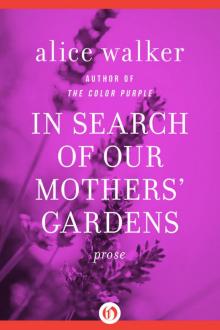 In Search of Our Mothers' Gardens: Prose
In Search of Our Mothers' Gardens: Prose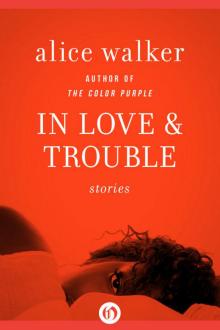 In Love and Trouble: Stories of Black Women: Stories of Black Women
In Love and Trouble: Stories of Black Women: Stories of Black Women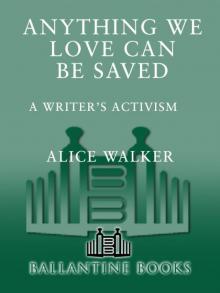 Anything We Love Can Be Saved
Anything We Love Can Be Saved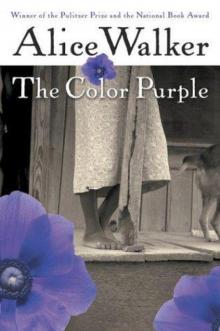 The Color Purple
The Color Purple By the Light of My Father's Smile
By the Light of My Father's Smile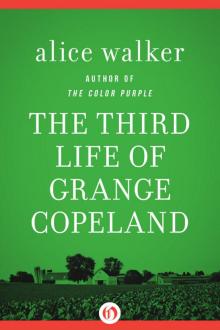 The Third Life of Grange Copeland
The Third Life of Grange Copeland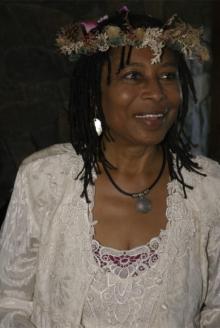 You Can't Keep a Good Woman Down
You Can't Keep a Good Woman Down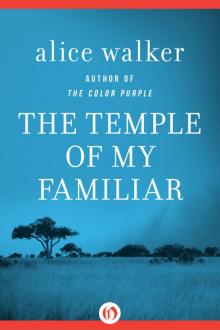 The Temple of My Familiar
The Temple of My Familiar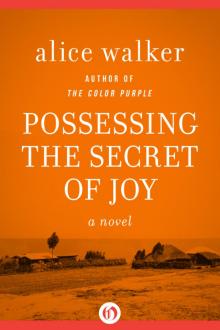 Possessing the Secret of Joy
Possessing the Secret of Joy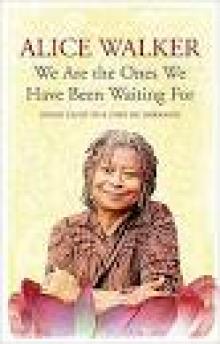 We Are the Ones We Have Been Waiting For
We Are the Ones We Have Been Waiting For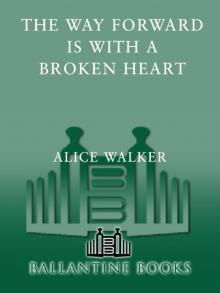 The Way Forward Is With a Broken Heart
The Way Forward Is With a Broken Heart Meridian
Meridian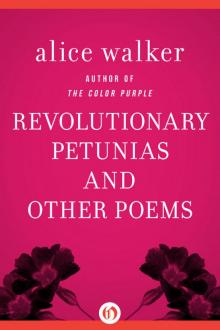 Revolutionary Petunias
Revolutionary Petunias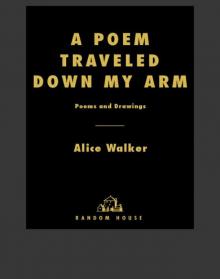 A Poem Traveled Down My Arm
A Poem Traveled Down My Arm Once
Once Horses Make a Landscape Look More Beautiful
Horses Make a Landscape Look More Beautiful Living by the Word
Living by the Word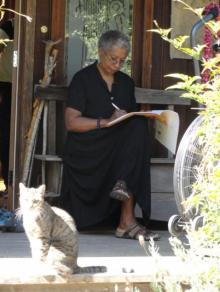 In Love and Trouble
In Love and Trouble The Color Purple Collection
The Color Purple Collection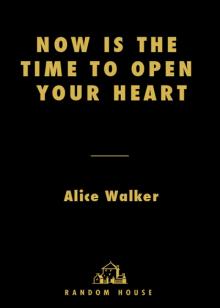 Now Is the Time to Open Your Heart
Now Is the Time to Open Your Heart Color Purple Collection
Color Purple Collection Taking the Arrow Out of the Heart
Taking the Arrow Out of the Heart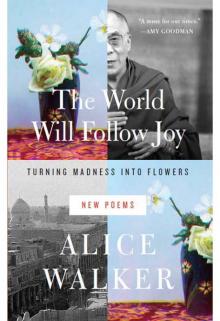 The World Will Follow Joy
The World Will Follow Joy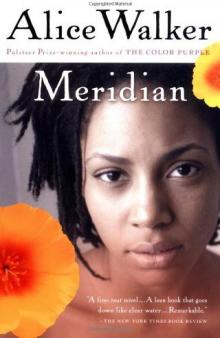 Meridian (1976)
Meridian (1976)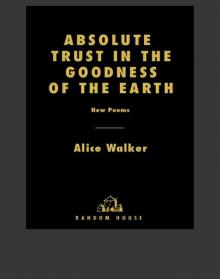 Absolute Trust in the Goodness of the Earth
Absolute Trust in the Goodness of the Earth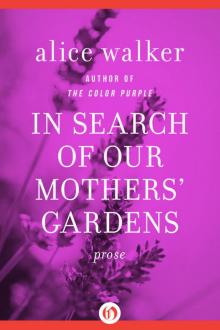 In Search of Our Mothers' Gardens
In Search of Our Mothers' Gardens